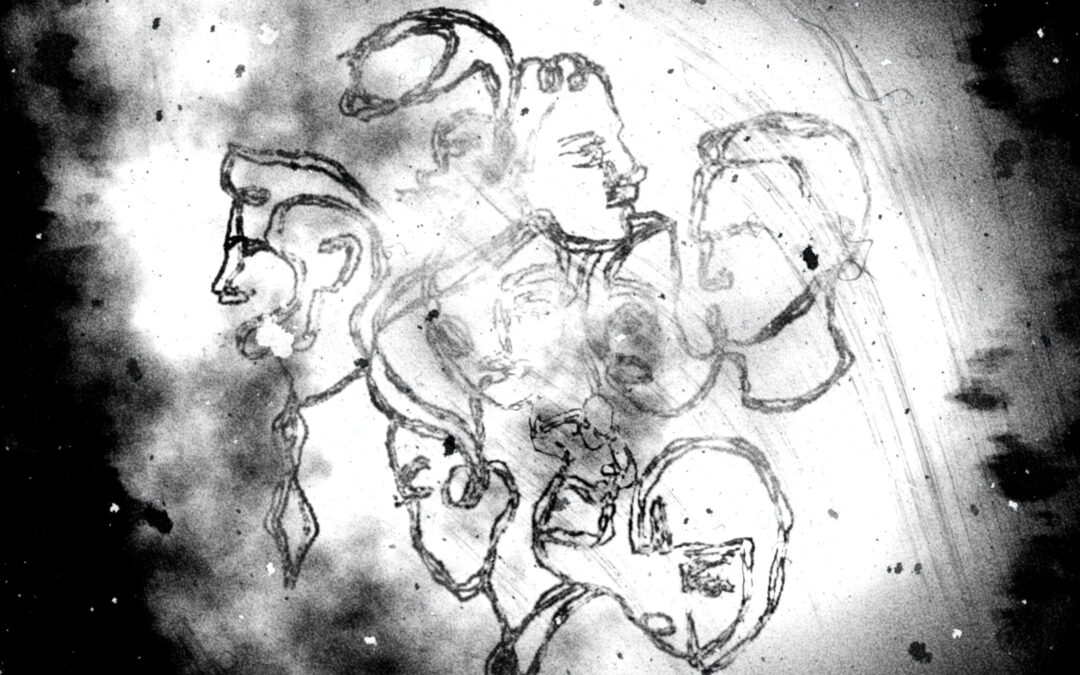Is it possible to be ethnographic and decolonial?
In our previous blog post, we explained that we would be taking a decolonial view in our long-term ethnographic research with families and unaccompanied young people with no recourse to public funds (NRPF), to help us better understand and explain the purposes, persistence and expansion of NRPF. I’m the Research Assistant on the Shadows project and I have a background in law and postcolonial studies, not social sciences, so it has been hard for me to imagine the decolonisation of a practice that has its genesis in and a long history of objectifying non-European people and lives and of serving European colonialisms and imperialism. My mind immediately goes to Edward Said’s salient critique of the evils of a classically colonial ethnography. And, although time has moved, we know that coloniality endures. So, as we begin to plan the fieldwork for Shadows, I’m confronting my fears about ethnography’s lingering coloniality.
In conversation with Rachel Rosen, I read the following texts, one after the other: Being Ethnographic: A Guide to the Theory and Practice of Ethnography by Raymond Madden, and Decolonizing Ethnography by Carolina Alonso Bejarano, Lucia López Juárez, Mirian A. Mijangos García and Daniel M. Goldstein. Madden’s Being Ethnographic deepened my fears about ethnography’s colonial hang-ups, but then Decolonizing Ethnography’s subversive, political and collaborative practice of ethnography allayed most of my fears. Although the authors of Decolonizing Ethnography situate their ethnography within decolonial scholarship, reading their text prompted me to think more carefully about what it really means to be decolonial.
Is it really possible to be ethnographic and decolonial and what does this means for our research project?
Classical ethnography
Firstly, what is ethnography and what does it mean to be ethnographic?
Being Ethnographic (Madden, 2019) is a widely cited text seeking to bring together the theory and practice of ethnography drawing on the author’s experience of research and teaching undergraduates. Madden generally describes ethnography as “a qualitative social science practice that seeks to understand human groups (or societies, or cultures, or institutions) by having the researcher in the same social space as the participants in the study” (2019, p.16). Being ethnographic, therefore, is the doing and thinking of ethnography.
Given that ethnography is a research practice that seeks to “understand human groups”, it is critical that we ask who was doing the understanding, who were they trying to understand and why? In other words, what is ethnography’s origin story?
Madden traces ethnography’s “ancestral heritage” (p.16) to the disciplines of British social anthropology, American cultural anthropology and the qualitative sociology of the Chicago School, and then traces the seemingly innocuous “trends” in being ethnographic, stating that “In the early days of ethnography one of the best things to think about was the radical alterity or stark difference of so-called ‘primitive’ people. And these ‘primitive’ people just so happened to live in ‘exotic’ places” (p.39). For Madden, the “exotic” and “primitive” nature of “isolatable, social and geographically discrete human groups” was a “powerful ethnographic trope” that ethnographers could interrogate then “translate to a wider audience” (p.38).
Thus – as the story goes – the human groups or societies or cultures that classical ethnography was seeking to understand were the colonised who were racialised, gendered, classed and imagined as radically different or “primitive” to, by and for enlightened white Europeans. Ethnography is, therefore, implicated in racist thinking and constructions of colonial differences between the coloniser and the colonised (Mignolo 2012 in Meghji 2020). Rather than engage in a meaningful examination of ethnography’s emergence from and service to European colonialisms, however, Madden insists that ethnography has historically been and is presently purposeful as a research method for “outsider” academics to produce “putatively objective” (p.23) and “scientific” ethnographies that “appreciate the social and cultural particulars of human existence”.
Any invocation of so-called objective, scientific knowledge about racialised, gendered and classed people from within the academy feels, intuitively, like a giant colonial red flag (!).
Instead of asking deeper questions about racism, power, objectification, extractivist knowledge production and what is it that social science research actually does (Tuck and Yang, 2014), Madden’s spin on ethnography takes on more of an evolution story-arc, as though the practice of ethnography has organically changed with the times. Presumably then, the context of anthropology’s emergence from and service to European colonialism is, for Madden, largely immaterial to its present-day practice. Far from being decolonial, therefore, Madden’s ideas of being ethnographic remain wedded to a colonial way of being, seeing and speaking for and about marginalised and racialised people. Or, at very least, by not directly confronting, critiquing and seeking to dismantle the impact of European colonialism, this winds up being the effect of his work. As Bejarano, Carolina, Juárez, García, and Goldstein (2019, p.7) note in Decolonizing Ethnography, deploying ethnography in this way “perpetually reinscrib[es] Western forms of knowledge, representation, and authority…to know the lifeworlds of others without contributing to those worlds or allowing their inhabitants to become full actors in or beneficiaries of the research process”.
Decolonizing Ethnography
In contrast, the academic researchers in Decolonizing Ethnography flipped the script on classical ethnography by teaming up with researchers who were outside of the academy and undocumented in the United States to collaboratively and, as much as possible, non-hierarchically shape and produce an ethnography on undocumented immigration in the United States. Rather than seeking or claiming some kind of objective expertise about people who are undocumented, as would be promoted in classical ethnography, the team crossed the binaries of insider/outsider, objective/subjective and academia/wider world to use ethnography as “as an instrument of self-discovery, community advocacy and collective struggle” (2019, p.12).
Going back to the perennial questions of who is doing the understanding, who is being understood and why, the research assistants who were undocumented and outside of the academy, Lucia López Juárez and Mirian A. Mijangos García, became ethnographers and “produce[d] knowledge about themselves for themselves”, thus challenging “the coloniality of anthropology itself” (2019, p.6). For the authors, this constitutes an activist anthropology that adopts a decolonial methodology wherein the historically colonial academic project is decentred and then an ethnography with political action at the heart of its practice is recentred. This requires ethnographers to move beyond a recognition of privilege and power to thinking, doing, reading and writing ethnographically alongside subordinated ‘Others’, and further by relinquishing control over knowledge production to together articulate conditions and struggles against oppression. Activist anthropology calls on ethnographers to use their work to contribute to and join struggles for liberation.
Regarding their ethnography on undocumented immigration in the United States, the researchers set out not to be extractive but to use their findings to “throw a monkey wrench into the workings of both the U.S. deportation regime and the academic-capitalist machinery of scientific research” (2019, p.10), thus aiming to contribute to, among other things, the internationalist struggle against capitalism and what Harsha Walia (2013) identifies as border imperialism. Juárez and García “not only learned about and collected data on these problems. They also used the research encounter to inform injured workers of their rights, to deliver services directly to them, to exhort them to become active in demanding benefits under the law, and to recruit them to join a local immigrant rights organization”. In the process, Juárez and García devise an “undocumented activists’ theory of undocumentation”, which the authors equate to a “native understanding of what it means to be undocumented and an activist in the twenty-first century United States” thus bridging the “global division of knowing” (2019, p. 11-12).
Given some of the dangers that follow ethnography’s claim to produce objective and scientific knowledge about subordinated groups, bridging ethnography’s divide in knowledge production is of huge significance. Equipping those facing the extreme violence of illegalisation with the power, platform and resources to study the oppressions they face more deeply and devise their own roadmap to liberation is indeed radical and should be celebrated as such. However, is it decolonial?
Instinctively, it might feel decolonial, but I am unsure what it actually means to be decolonial. In Decolonizing Ethnography, the authors draw on decolonial theory’s distinction between colonialism and coloniality, as follows:
“Colonialism is a system of political, economic, and cultural domination in which one nation or people establishes sovereignty over another. Coloniality is what endures, long after the formal systems of colonial rule have disappeared” (2019, p.22)
However, the authors are specifically researching and writing ethnography within the specific context of US settler colonialism, so is it that formal colonialism has disappeared in the United States? Is it that settler colonialism is historical or is it ongoing? Is it a persistent structure or a past event (Rowe and Tuck, 2017)?
Decolonisation is not a metaphor
I turned to Eve Tuck and K Wayne Yang’s (2012) Decolonization is not a metaphor to better understand decolonisation within the specific context of settler colonialism, as informed by Indigenous social thought and critique. What I have understood thus far from their work is that Tuck and Yang do not attempt to universalise or put forward an all-encompassing definition of decolonisation. (I imagine because that would be rather colonial!) Instead, they distinguish between different forms of colonialisms, namely external, internal and settler colonialisms, and assert that decolonisation would take on different forms and meanings in different colonial contexts. They discuss in detail what decolonisation requires in the context of a settler colony, that is where settlers attempt to erase and eliminate Indigenous populations and take Indigenous land and life as their own. Tuck and Yang state that in a settler colonial nation state such as the United States, decolonisation would? “brings about the repatriation of Indigenous land and life” (2012, p.1) and is distinct from, and not a synonym for, social justice and human rights projects.
The United States is concurrently a settler colony and an empire. Tuck and Yang argue that settlers can enter or be brought into Indigenous lands that are “diverse…and include people of color, even from other colonial contexts” through “colonial pathways” such as immigration (2012, p.7). Tuck and Yang state that attempts by settlers – even those who are marginalised, racialised and oppressed themselves – to gain access to the colonial apparatus of legal rights is still an “investment in settler colonialism”. Further, collapsing a multitude of struggles against oppression in the United States that do not seek to further Indigenous sovereignty or unsettle/deoccupy land remains an “investment in settler colonialism” (2012, p.18). Theorising civil and human rights struggles as decolonial are essentially settler moves to innocence, whereby settlers, including those struggling against oppression and marginalisation, seek to reconcile their feelings “of guilt or responsibility [in settler colonialism], and conceal the need to give up land or power or privilege” (2012, p.21).
Reminders recur throughout their article that decolonisation is unsettling and unsettles everything and everyone. They call on people to carefully and precisely distinguish between anti-colonial critiques that may, for example, pursue stolen resources on stolen land, and decolonisation frameworks, that seek to undo colonialism, and stress that recognition of this distinction, or their incommensurability, holds real promise and possibility for solidarity. They write:
“To fully enact an ethic of incommensurability means relinquishing settler futurity, abandoning the hope that settlers may one day be commensurable to Native peoples. It means removing the asterisks, periods, commas, apostrophes, the whereas’s, buts, and conditional clauses that punctuate decolonization and underwrite settler innocence. The Native futures, the lives to be lived once the settler nation is gone – these are the unwritten possibilities made possible by an ethic of incommensurability… Decolonization offers a different perspective to human and civil rights based approaches to justice, an unsettling one, rather than a complementary one. Decolonization is not an “and”. It is an elsewhere.” (2012, p.31)
Reading Tuck and Yang may indeed feel unsettling, but hopefully in mind-expanding and solidarity-enhancing ways. It certainly pushed me to reflect more critically on the ubiquity of metaphorising decolonisation – almost using it like a Diversity, Equity, and Inclusion (DEI) buzzword (for shame!) – thus removing meaning from what it is to materially decolonise and (in settler colonial nation states) contributing to the erasure of Indigenous peoples.
Perhaps then we can problematise the decolonisation of ethnography, as presented in Decolonizing Ethnography. On the one hand, I appreciate that the researchers are attempting to undo the coloniality entrenched in ethnography specifically. The methods and practices used in Decolonizing Ethnography subvert a historically hierarchical and colonial research method and give power and resources to illegalised and Otherised individuals and groups, as well as agency over how and to what end the knowledge gained from research is to be used. This is indeed transformative and goes against colonial legacies engrained in classical ethnography. However, they are still practicing ethnography and producing theory amidst the ongoing colonisation of Indigenous lands, so if decolonisation is to remain meaningful, and if theory is to connect with material reality, then shouldn’t their research and the decolonial theory in their text engage with or contribute to the undoing of the ongoing theft, occupation and settlement of Indigenous lands and life?
This is not to say that research that seeks to counter and alleviate the immeasurable harm caused by imperialism and (neo)colonialism is not important, nor urgent, but perhaps more precision in the naming of what our research can and does do will help us resist collaborating with and reproducing colonial erasure, knowledge and power, and instead ground our work in genuinely radical solidarity/ethic of incommensurability, community and accountability. Following Tuck and Yang’s understanding of decolonisation, perhaps it would be more accurate to name the ethnography practiced in Decolonizing Ethnography as anti-colonial. Doing so honours a deep responsibility that all settlers have to Indigenous peoples on their lands and preserves the promise of solidarity, without overclaiming or erasing ongoing colonialism.
In the words of environmental scientist, Max Liboiron, in What it means to practice values-based research:
“Decolonization is a very promiscuous term. I’ve stopped using it because it’s been so heavily co-opted and become meaningless. I’ll instead say anti-colonization, which means, we are not assuming entitlement to Indigenous land and life for resource use or research access. For example, asking permission before working on Indigenous land is minding your manners in a way that doesn’t reproduce colonization. The use of the term anti-colonization is just being more specific about what we’re doing” (Liboiron in Raman, 2023).
What do we want to do?
This is only a first effort to engage with long-standing and extensive debates about decolonialism, and I am really looking forward to deepening my knowledge and understanding of what decolonial theory and practice mean in the imperial metropole, because of course the UK context is different to the US context. For now, I remain cautious of misusing and conflating terminology that has enormous but distinctive significances and material consequences around the world.
Perhaps we don’t really need to give a yes or no answer to the question of whether we can be decolonial and ethnographic just yet anyway, and we can instead ask ourselves what do we want our research to do and can ethnography help us do that?
Educator, organiser, prison-industrial complex abolitionist and writer (and more), Mariame Kaba once said, “We need deep solidarity and co-strugglership with folks” (Kaba in Ewing 2019).I am hoping Shadows will better our collective understanding of the deep and enduring effects of making and sustaining lives in the UK with no recourse to public funds so that, among other things, we can better respond collectively to this type of state violence that permeates the lives of so many of our neighbours, friends, comrades and people we don’t know who are exercising their freedom to move and stay. With that in mind, can an anti-colonial ethnography be a potent instrument in helping us learn, think, dream and produce ideas and knowledge about justice and liberation collectively? Can it help cultivate a deeper solidarity and co-strugglership between people who are and who are not subject to NRPF/immigration control, who may live in different circumstances but share a commitment to confronting colonial and other types of violences in our world? Finally, can ethnography be a tool that helps transform our social relationships and, in turn, strengthen our resistance against colonialism, imperialism and capitalism, as well as struggles to make other decolonial worlds possible? I am excited to find out!
References
Madden R (2017) Being Ethnographic: A Guide to the Theory and Practice of Ethnography. Sage.
Bejarano CA, Juárez LLp, García MAM, et al. (2019) Decolonizing ethnography : undocumented immigrants and new directions in social science. Durham: Duke University Press.
Meghji, M (2020), Decolonizing Sociology: An Introduction. Polity.
Tuck E, Yang KW (2014), R-Words: Refusing Research. Humanizing Research: Decolonizing Qualitative Inquiry with Youth and Communities (pp.223-248)
Rowe AC, Tuck E (2017), Settler Colonialism and Cultural Studies: Ongoing Settlement, Cultural Production, and Resistance. Sage.
Walia, H (2013), Undoing Border Imperialism. AK Press.
Raman, S, (2023), What it means to practice values based research. Environmental scientist Max Liboiron ties principles of humility and accountability to research that respects people and their relationship with the land. Nature.
Ewing EL (2019), Mariame Kaba: Everything Worthwhile Is Done With Other People. Adi Magazine
Shadows Team (2023), Welcome to the Shadows research project.







